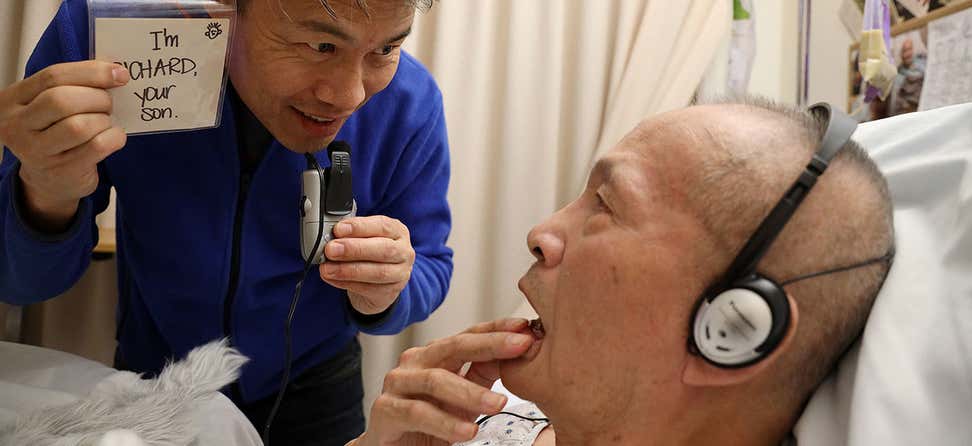Caregiving isn’t just a job or a list of tasks to be completed. It’s a deeply personal and often all-encompassing role that impacts every area of a caregiver’s life. Currently, there are about 60 million Americans who provide unpaid care to a relative or other person with a physical or mental illness.1 Nearly half of all caregivers are over the age of 50.2
Caregivers, who are often family members, play a vital part in the well-being of people with mental illness. They provide everything from practical daily support to help with finding mental health services and resources.
"You may have heard the sentiment that family caregivers are the backbone of our long-term services and support system in this country,” said Greg Link, Director of the Office of Supportive and Caregiver Services at the Administration for Community Living (ACL). “I would argue that they're not only the backbone, but they're the foundation and the lifeblood of that system." Link was one of several speakers featured in a breakout session, “Supporting Caregivers Providing Care to Someone with Mental Illness,” at our Older Adults Mental Health Awareness Day (OAMHAD) Symposium.
Advocating for the needs of family caregivers is a top priority for ACL, which in 2022 launched the first-ever National Strategy to Support Family Caregivers. This initiative outlined hundreds of actions that can be adopted across the public and private sector to help family caregivers look after their own health, emotional well-being, and financial security.
Caregivers of people with mental illness face unique challenges
Caregiving in any form can be a tough job. It has its joys and rewards—but at times it’s also stressful, time-consuming, and thankless. Balancing caregiving duties with your own personal obligations can leave you feeling overwhelmed. It can even cause you to neglect your own health and well-being.
Jamie Huysman, LCSW, CAP, is a family caregiver advocate, authority on caregiver burnout, and co-author of Take Your Oxygen First: Protecting Your Health and Happiness While Caring for a Loved One with Memory Loss. In the OAMHAD session, he talked about the profound stressors caregivers face. "We saw caregivers passing away before their loved ones were passing away… we saw that they obviously were dealing with stress and burnout and compassion fatigue,” he explained. “And mental health caregivers have an extraordinarily more difficult time."
Caring for a person with mental illness brings a special set of challenges. While most of us can empathize with a physical impairment, it's not always easy to understand what someone with a mental health disorder is going through. People struggling with mental health issues can have challenging behaviors. Their symptoms may be upsetting, confusing, and unpredictable. Recovery from mental illness can be long and grueling, and in some cases, a person won't accept the help or treatment they need.
What's more, there are societal stigmas around mental health issues that can lead to feelings of shame and guilt as well as a lack of understanding from others. This can make it even more difficult to come forward and seek the support and help you need as a caregiver.
Given these challenges, it’s no wonder depression, anxiety, and other mental health issues are common among caregivers. In fact, the Family Caregiver Alliance calls caregiver depression "one of today’s all-too silent health crises," estimating that at least 20% of family caregivers suffer from this disorder.3
According to an infographic from Mental Health America:
- Caregivers of people with a mental illness are 21% more prone to high emotional stress than those who care for someone with a physical condition.
- 31.5% of caregivers for people with schizophrenia said they experience psychological distress.
- More than 1/3 of caregivers for people with bipolar disorder reported major symptoms of depression.4
How can you take better care of yourself to minimize the strains of caregiving? The tips below can help.
5 support strategies for caregivers
1. Practice regular self-care
Looking after a person with a mental illness can be physically and emotionally exhausting. When you feel tired and drained, it can cause negative feelings and affect your ability to cope with stress. That's why it's important to recharge your batteries with these self-care habits:
- Get plenty of sleep—at least 7 hours each night
- Eat healthy, balanced meals
- Exercise regularly
- Practice meditation, yoga, or other calming techniques
- Read a book or listen to soothing music
Simply taking the time to enjoy yourself is important as well. For example, a relaxing hobby can help you renew your energy and put your best foot forward as a caregiver. Here are some caregiver hobbies to explore.
Ruth Fox is Chief Executive Officer at Allegheny Family Network. She's also a caregiver to a spouse with a mental illness. During the OAMHAD session, Ruth talked about the importance of taking breaks from caregiving and getting out of the house. “You have to have things to do together that are fun, that make you feel good and happy, and just like every other person,” she said.
2. Join a support group
A caregiver support group provides a safe space to express your feelings, fears, and frustrations with people who truly understand what you're going through. Not only do these groups offer social connection; they can be valuable sources of information and advice.
Caregiver support groups vary in their setup. Some are peer-led, while others are run by a trained facilitator. Groups may target specific conditions (e.g., caregivers of people with dementia) or certain types of caregivers (e.g., those caring for a veteran). You may need to try one or more caregiver support groups to find one that feels right to you.
To find a group in your area:
- Check with your local hospitals and healthcare facilities, community and senior centers, and faith-based organizations.
- Reach out to organizations specific to the mental health diagnosis of the person you’re caring for. For example, the Depression and Bipolar Support Alliance and the Anxiety & Depression Association of America offer resources for both online and in-person support.
- Use the Eldercare Locator to find your local Area Agency on Aging and other resources for older adults and caregivers.
If you prefer online support, Mental Health America offers online communities for various groups, including family and caregivers. You can also search Facebook for “caregiver support groups” to see if any interest you. Note: Groups marked "Private" are closed groups, meaning your posts and comments can only be seen by other members of the group. They will not appear on your personal Facebook page.
3. Find respite care
Another great tool for caregivers is respite care. This type of care provides short-term relief to give you a break from the heavy responsibilities of caregiving. Respite care can take place in the home or another setting and can last anywhere from a few hours to a few weeks. While in respite care, you can be assured your loved one will have all their care needs met.
Since most insurance plans do not cover the costs of respite care, these costs must be paid out of pocket. However, some federal, state, and community programs provide special funding to help caregivers utilize these services.
To find respite care services in your area, try the ARCH National Respite Locator or reach out to your local Area Agency on Aging.
4. Contact organizations that help caregivers
There are many national programs and organizations that can help you address the challenges of caring for someone with a mental illness. Assistance is often free or offered at a low cost.
For example, the U.S. Department of Veterans Affairs (VA) has a variety of resources for caregivers of veterans. "Caregivers tell us that this can be a very rewarding role, but we also know that caregiving can take a toll on the caregiver,” said OAMHAD presenter LaQuana Fulton, MSW, MS, LCSW, CSW-G, National Training and Education Coordinator for the VA Caregiver Support Program. VA caregiver support services include respite care, two caregiver support programs, a 1-800 support line, and more.
Other organizations dedicated to caregivers include:
5. Seek professional counseling
Another way to find caregiver support is through therapy. A skilled licensed therapist or counselor can help you process what you're feeling, improve your ability to solve problems, and learn to set healthy boundaries. Their job is to listen without judgment and give you the tools you need to cope with caregiving challenges in productive ways.
Check with your health insurance plan to find a covered mental health services provider in your area. Many therapists today offer online (video) sessions in addition to in-person sessions.
Bottom line
As a caregiver, you must be in tune with the needs of the person you're caring for. But it's just as important to be in tune with your own needs.
According to Dr. Jamie Huysman, caregivers should work on showing kindness and love toward themselves. "There's no way we can provide compassion to others until we as caregivers start doing it for ourselves,” he explained. “You can't light up another person's world if your bulb is out.”
Want to learn more about caregiver self-care, financial assistance, and other topics? Visit NCOA's Support for Caregivers resource library.
Sources
1. Mental Health America. Caregiving for a Person with a Mental Illness. Found on the internet at https://www.mhanational.org/caregiving-person-mental-illness
2. Administration for Community Living. National Family Caregivers Month. October 20, 2021. Found on the internet at https://acl.gov/news-and-events/downloads-and-multimedia/NFCM
3. Family Caregiver Alliance. Caregiver Health. Found on the internet at https://www.caregiver.org/resource/caregiver-health/#20
4. Mental Health America. Infographic: Family Caregivers Month. Found on the internet at https://mhanational.org/infographic-family-caregivers-month
This project was supported, in part by grant number 90CSSG0048 and 90FPSG0051 from the U.S. Administration for Community Living, Department of Health and Human Services, Washington, D.C. 20201. Grantees undertaking projects under government sponsorship are encouraged to express freely their findings and conclusions. Points of view or opinions do not, therefore, necessarily represent official Administration for Community Living policy.









